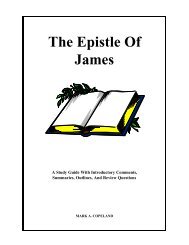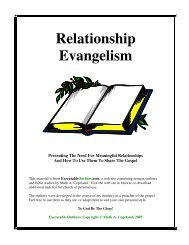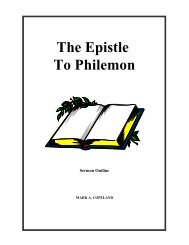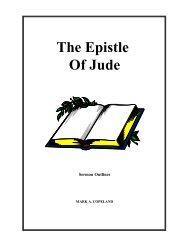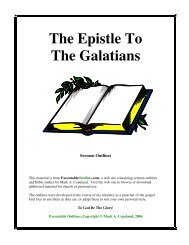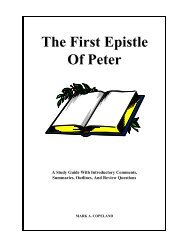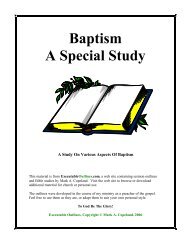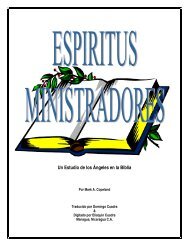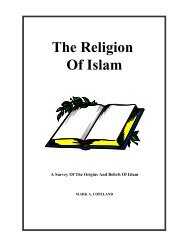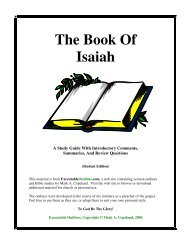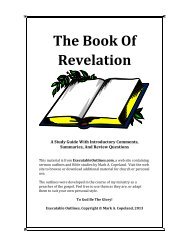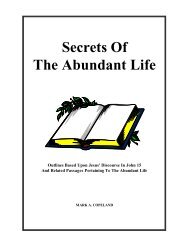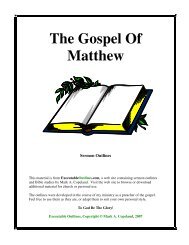The Epistle To The Hebrews - Executable Outlines
The Epistle To The Hebrews - Executable Outlines
The Epistle To The Hebrews - Executable Outlines
Create successful ePaper yourself
Turn your PDF publications into a flip-book with our unique Google optimized e-Paper software.
Mark A. Copeland<br />
D. THE NEW COVENANT HAS MADE THE FIRST “OBSOLETE”... (13)<br />
1. By even calling the promised covenant “new”, God made the first covenant obsolete<br />
a. <strong>The</strong> old covenant actually continued on for about 500 years after Jeremiah<br />
b. But with the promise of the new, attention would be taken away from the Old Covenant<br />
and directed toward the new one that was coming!<br />
2. Its obsolescence was especially seen in the days of the Hebrew writer...<br />
a. It was “becoming obsolete and growing old”<br />
1) <strong>The</strong> death of Jesus rendered the sacrifices of the first covenant unnecessary<br />
2) Before long, the temple itself would be destroyed, and along with it, the last vestiges<br />
of the Levitical priesthood<br />
b. Truly, it was “ready to vanish away”<br />
[So God promised a “new covenant” to replace the “old covenant”; and Jesus is the “Mediator” of this<br />
covenant, which is “a better covenant”. Better in what way? Better because it “was established on<br />
better promises”. Let’s now consider some of...]<br />
II. GOD’S PROMISES INVOLVING THE NEW COVENANT (10-12)<br />
A. IT WILL BE INWARD AND SPIRITUAL... (10)<br />
1. “I will put My laws in their mind and write them on their hearts”<br />
2. <strong>The</strong> first covenant had its laws written on tablets of stone; the new covenant is one that<br />
requires God’s laws be written in our hearts<br />
3. It is not enough to have God’s Word in our hands, on our coffee tables, etc.<br />
a. We must plant God’s Word into our hearts - cf. Ja 1:21<br />
b. For only then can we truly be born again by the incorruptible seed, the word of God<br />
- 1 Pe 1:22-23<br />
-- Are you living up to intent of the New Covenant, or are you little different than those under<br />
the first covenant, who had the Word, but not on their hearts?<br />
B. IT WILL PROVIDE A CLOSER RELATIONSHIP WITH GOD... (10)<br />
1. “I will be their God, and they shall be My people”<br />
2. <strong>The</strong> actual terms of this promise is really nothing new - cf. Exo 6:7; Lev 26:12<br />
3. But in each successive “age”, its promise is filled with fresh meaning; for example...<br />
a. In “this age”, we enjoy a closer relationship with God - cf. 2 Co 6:16-18; 1 Pe 2:9-10<br />
b. But even more so, in the “age to come”, which is in eternity - cf. Re 21:1-7<br />
-- Are you utilizing the blessings whereby you can have a closer relationship with God?<br />
C. IT WILL BE WITH PEOPLE WHO KNOW THE LORD... (11)<br />
1. “None of them shall teach...saying, ‘Know the Lord’, for all shall know Me...”<br />
2. <strong>The</strong> New Covenant will be with people who have already come to know the Lord<br />
a. Unlike the first covenant, in which people entered it at birth; as they grew up, they<br />
needed to be taught about the Lord<br />
b. In the new covenant, one must come to know the Lord before they can enter the<br />
covenant<br />
3. So it is that one must believe in Jesus before they can enter into a covenant relationship with<br />
their Lord through baptism - cf. Ac 8:36-38<br />
-- Does not this feature of the New Covenant preclude the practice of infant baptism?<br />
Sermons From <strong>Hebrews</strong> 64



